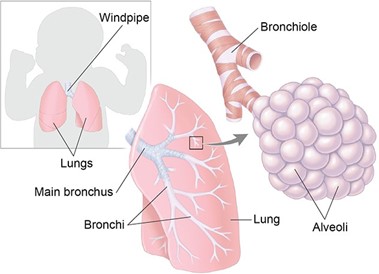A newborn is jaundiced and receivesphototherapy via ultraviolet bank lights.
An appropriate nursing intervention when caring for an infant with hyperbilirubinemia and receiving phototherapy by this method would be to:
Apply an oil-based lotion to the newborn’s skin to prevent drying and cracking.
Limit the newborn’s intake of milk to prevent nausea, vomiting, and diarrhea.
Place eye shields over the newborn’s closed eyes.
Change the newborn’s position every 4 hours.
The Correct Answer is C
Placing eye shields over the newborn’s closed eyes. This is because phototherapy can cause eye damage and irritation to the newborn, so eye protection is essential.
Choice A is wrong because oil-based lotion can increase the absorption of heat and cause burns to the newborn’s skin.
Choice B is wrong because limiting the newborn’s intake of milk can cause dehydration and increase the risk of hyperbilirubinemia.
Choice D is wrong because changing the newborn’s position every 4 hours is not frequent enough to prevent pressure ulcers and ensure even exposure to the light.
Normal ranges for bilirubin levels in newborns are 1 to 12 mg/dL for term infants and 3 to 14 mg/dL for preterm infants. Phototherapy is usually indicated when the bilirubin level exceeds 15 mg/dL for term infants and 10 mg/dL for preterm infants.
Nursing Test Bank
Naxlex Comprehensive Predictor Exams
Related Questions
Correct Answer is A
Explanation
choice A. Surfactant improves the ability of your baby’s lungs to exchange oxygen and carbon dioxide.

Surfactant is a substance that coats the inner surface of the alveoli, the tiny air sacs in the lungs.
It reduces the surface tension of the alveoli and prevents them from collapsing during exhalation.
Premature infants often lack enough surfactant, which leads to respiratory distress syndrome (RDS).
Artificial surfactant is given to these infants to help them breathe more easily. Choice B is wrong because surfactant has nothing to do with sedation.
Sedation is a state of reduced consciousness induced by drugs. Surfactant does not affect the level of consciousness of the infant.
Choice C is wrong because surfactant is not used to reduce episodes of periodic apnea.
Periodic apnea is a condition where the infant stops breathing for a short time, usually due to immature brainstem function.
Surfactant does not affect the brainstem or the control of breathing.
Choice D is wrong because surfactant is not used to fight a possible respiratory tract infection. Surfactant does not have any antibacterial or antiviral properties.
Surfactant is used to treat RDS, which is caused by a lack of surfactant, not by an infection.
Correct Answer is C
Explanation
Verbalizing the importance of monitoring for medication side effects.
Graves’ disease is an autoimmune disorder that causes hyperthyroidism, which means the thyroid gland produces too much thyroid hormone. This can lead to symptoms such as weight loss, increased appetite, nervousness, irritability, insomnia, heat intolerance, and palpitations. The medication methimazole is used to treat Graves’ disease by blocking the synthesis of thyroid hormone. However, methimazole can also cause serious side effects such as liver damage, agranulocytosis (low white blood cell count), and allergic reactions.
Therefore, the priority nursing goal for a 14 year old diagnosed with Graves’ disease is to verbalize the importance of monitoring for medication side effects and reporting them to the health care provider.
Choice A is wrong because relieving constipation is not a priority goal for Graves’ disease. Constipation is more likely to occur in hypothyroidism, which is the opposite of hyperthyroidism.
Choice B is wrong because allowing the adolescent to make decisions about whether or not to take medication is not a priority goal for Graves’ disease. While it is important to respect the adolescent’s autonomy and involve them in their care plan, they also need to understand the risks and benefits of taking medication and the consequences of not taking it.
Choice D is wrong because developing alternative educational goals is not a priority goal for Graves’ disease. Graves’ disease can affect the academic performance of adolescents due to cognitive and emotional changes caused by hyperthyroidism.
However, this does not mean that they need to change their educational goals. They may need extra support and accommodations from their teachers and parents to cope with their condition and achieve their potential.
Whether you are a student looking to ace your exams or a practicing nurse seeking to enhance your expertise , our nursing education contents will empower you with the confidence and competence to make a difference in the lives of patients and become a respected leader in the healthcare field.
Visit Naxlex, invest in your future and unlock endless possibilities with our unparalleled nursing education contents today
Report Wrong Answer on the Current Question
Do you disagree with the answer? If yes, what is your expected answer? Explain.
Kindly be descriptive with the issue you are facing.
